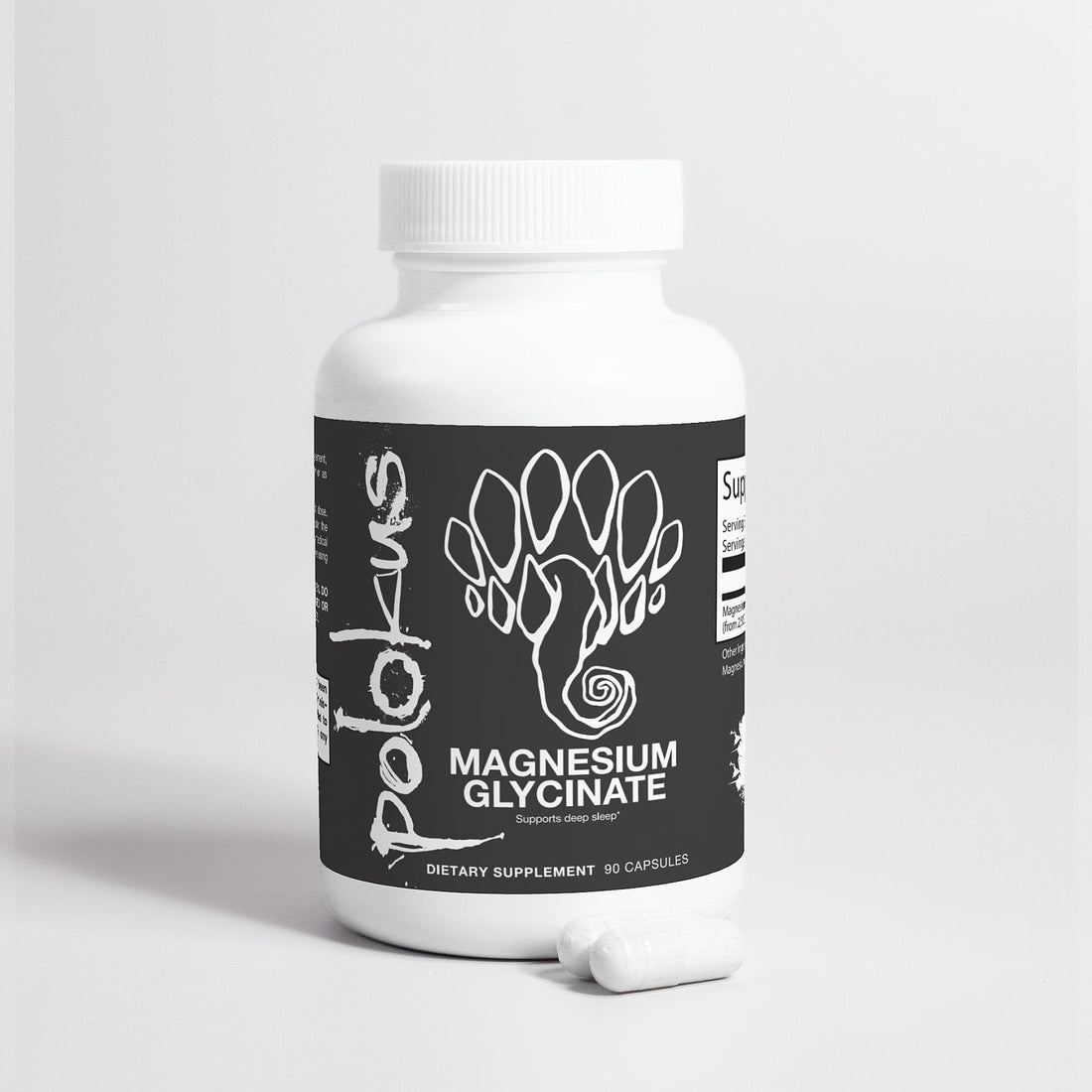
Why Magnesium Deficiency Is So Common — And What You Can Do About It
Share
Magnesium is one of the most essential minerals in the human body — but most people aren’t getting enough. It’s involved in hundreds of physiological processes: muscle function, sleep regulation, stress response, hydration, energy metabolism, and more. But due to modern diets and lifestyle stress, magnesium deficiency is now common, especially in athletes, bodybuilders, and anyone eating the standard American diet.
Daily supplementation with highly bioavailable forms like magnesium glycinate may help restore healthy levels, improve sleep quality, reduce muscle cramps, support hydration, and promote recovery. This article reviews recent clinical trials (2019–2024) on different forms of magnesium supplementation and their effects on sleep, hydration, and mineral balance — with an emphasis on efficacy, dosage, and long-term safety.
The Silent Epidemic: Widespread Magnesium Deficiency
Roughly 48% of Americans don’t get enough magnesium through diet alone (Volpe, 2013). The biggest culprits? Overly processed foods, mineral-depleted soil, and excessive sugar and caffeine intake. Magnesium-rich foods — like leafy greens, nuts, seeds, and whole grains — are often absent from modern meals.
Athletes and hard-training individuals may have even higher requirements due to losses through sweat and urine (Nielsen & Lukaski, 2006). And stress itself can deplete magnesium stores faster, making it a vicious cycle.
Why Magnesium Glycinate Stands Out
Magnesium glycinate is one of the best magnesium supplements for absorption and tolerability. It’s a chelated form, meaning magnesium is bound to the amino acid glycine — which is calming in its own right. This form is much less likely to cause digestive upset (compared to magnesium citrate or oxide), making it ideal for daily use.
Clinical research supports magnesium glycinate’s ability to:
- Promote deeper, more restorative sleep
- Reduce nighttime awakenings and muscle cramping
- Support hydration and electrolyte balance
- Calm the nervous system without sedation
Sleep Benefits of Magnesium Supplementation
Magnesium regulates neurotransmitters like GABA and supports melatonin production — both of which are crucial for quality sleep. In a 2021 randomized controlled trial, older adults who took magnesium glycinate for sleep experienced significantly improved sleep quality and time and reduced nighttime cortisol (Abbasi et al., 2021).
Another 2022 study on physically active adults found that daily magnesium glycinate supplementation helped reduce insomnia symptoms and improved subjective sleep quality after 8 weeks (Zhu et al., 2022).
Muscle Recovery & Hydration: What the Studies Show
Magnesium supports ATP production, muscle relaxation, and electrolyte regulation — all key for recovery and performance. A 2023 study published in Nutrients showed that magnesium supplementation improved hydration status and electrolyte retention in endurance athletes over 12 weeks (Beck et al., 2023).
Another trial on strength athletes found that magnesium glycinate for muscle recovery reduced markers of muscle damage and inflammation while enhancing post-workout recovery (Darban et al., 2021).
Comparing Forms: Glycinate vs. Citrate vs. L-Threonate
- Magnesium Glycinate: Highly bioavailable. Gentle on the stomach. Ideal for daily use, sleep support, and stress management.
- Magnesium Citrate: Good absorption but often causes loose stools. Better suited for occasional constipation support.
- Magnesium L-Threonate: Crosses the blood-brain barrier effectively and may support cognitive health, but it’s more expensive and offers less elemental magnesium per dose.
For everyday health — especially better sleep, improved recovery, and optimal hydration — magnesium glycinate offers the most well-rounded benefits.
Dosage, Absorption, and Long-Term Safety
Most clinical studies use doses between 200 mg to 400 mg of elemental magnesium per day, often divided into morning and evening doses. Magnesium glycinate supplements provide roughly 14% elemental magnesium by weight, so a 500 mg capsule typically offers ~70 mg elemental magnesium.
It’s well-tolerated long-term. A 2020 safety review concluded that magnesium glycinate posed no risk of toxicity at commonly recommended doses and may even reduce the need for sleep aids or NSAIDs (de Baaij et al., 2020).
Those with kidney issues should consult a healthcare provider, as impaired kidneys can affect magnesium clearance. But for most healthy adults, magnesium glycinate is a safe, effective option.
Summary: Why Magnesium Glycinate Deserves a Place in Your Stack
If you're serious about recovery, sleep quality, and hydration, magnesium glycinate should be a staple in your supplement stack — especially if you train hard, live a high-stress lifestyle, or eat a modern processed diet.
With clinical studies backing its use for sleep support, muscle recovery, and electrolyte balance, magnesium glycinate is the most effective and gut-friendly option for daily magnesium supplementation.
Looking to try it yourself? Check out Polokus Magnesium Glycinate — a highly absorbable magnesium supplement formulated for maximum results.